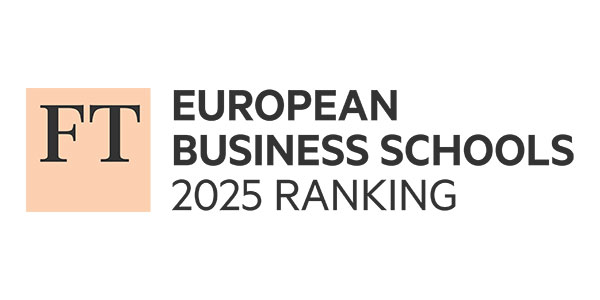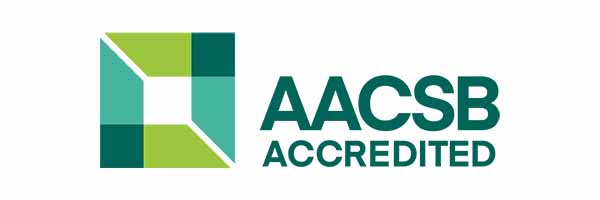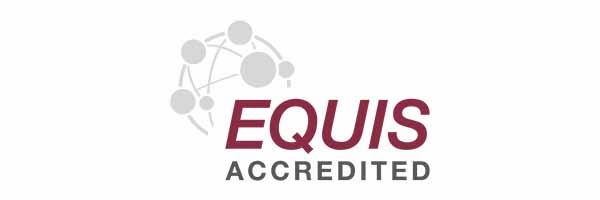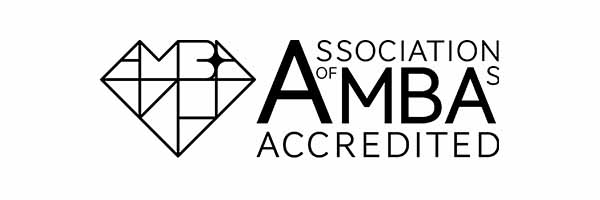BA Hons International Business
ApplyKey facts
- UCAS Code: N120
- Accreditation: triple-accredited Business School - AACSB, EQUIS, AMBA
Study abroad: exchange links with universities worldwide
Applicant visit days: these take place in March each year
Study with us
On the BA Hons International Business you'll:
- gain the skills to succeed in a complex and ever-changing global business environment
- study abroad at one of our partner institutions in Europe, South East Asia, Australasia or North America
- boost your career prospects, with an understanding of international business from another country's perspective
- develop skills which are highly valued by graduate recruiters through our innovative Management Development Programme
The Place of Useful Learning
UK University of the Year
Daily Mail University of the Year Awards 2026
Scottish University of the Year
The Sunday Times' Good University Guide 2026
Why this course?
Our International Business (IB) degree will give you the opportunity to understand the international business environment.
It offers you a life-changing experience where you’ll study abroad for one semester at an international partner institution.
It will prepare you for the world of international business while allowing you to specialise in a chosen area.
This experience will really boost your career prospects; not only will you have an understanding of international business from another country’s perspective but it will give you the chance to become fluent in the language.
Specialising
You’ll choose a specialism from the following:
- Business Analysis & Technology
- Business Enterprise
- Economics
- Finance
- Hospitality & Tourism Management
- Human Resource Management
- Marketing
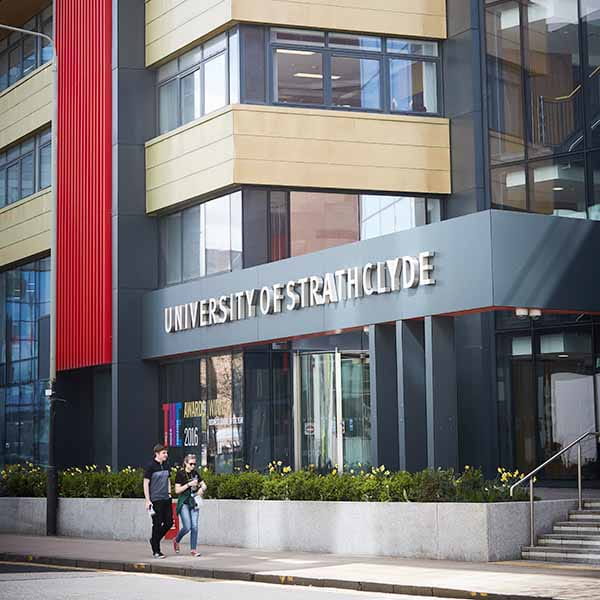

What you’ll study
Years 1 & 2
In the first year, you'll take a range of business subjects, including international business, to provide you with a foundation in business.
You'll also take a module in academic skills to support you in developing skills that are important to both your academic and future career. At the end of your first year, you'll choose two Business subjects to take into your second and third year.
Year 3
You’ll study classes in business and international business, in English, at a partner university of business school elsewhere in Europe, South East Asia, Australasia or North America. Students will spend one semester abroad. Throughout the first three years, you’ll undertake the Management Development Programme, which is designed to develop your business skills and competencies.
Year 4
You’ll study International Business as well as a business specialism. You’ll also write a dissertation, investigating a topic of expertise you’ve developed over your degree which will have an International Business focus. This allows you to take a focused piece of research while demonstrating your well-developed analytical and research skills to potential employers.
Study abroad
This course includes a compulsory exchange period in Year 3 when you'll spend time abroad studying at one of our partner business schools. We currently send students on exchange to various universities all over the world.
Guest lectures
During your final year of study, you'll attend the Contemporary Issues and Trends in International Business class where you'll have the opportunity to attend a series of guest lectures delivered by high calibre practitioners from both national and international organisations.
Course content
In Year 1 you'll study a range of business subjects including international business. This will provide you with a foundation in business. From Year 2 you'll take modules in the subjects in which you choose to specialise in addition to international business.
The Management Development Programme (MDP) is also a core element of the undergraduate programme in the Strathclyde Business School. The programme runs for the first three years of the BA degree and is driven by real business problems. The approach to learning is active problem-based, with students working in project teams.
MDP provides an opportunity to integrate the knowledge and experience gained from your business subjects. Each year of MDP focuses on different aspects of business and the content of MDP is constantly evolving and being updated and enhanced.
Introduction to International Business
This module introduces learners to the field and practice of international business and management.
Drawing on classical and recent debates in theory and practice including, but not limited to commercial concerns, learners will be equipped with an understanding of the foundational principles and developments of the subject.
In the module, we consider how international business and management is researched, and facilitate a critical understanding based on real-life case studies in international contexts. This module gives learners the capacity to look at the past, present and future in organisations and provides the foundations for intellectual progression in the subject, and broadly, for year two and beyond.
Introduction to Marketing & Entrepreneurship
The aim of this module is to provide you with a solid foundation and understanding of the theories and principles underlying marketing and entrepreneurship. A combination of the subjects will be taught to enhance understanding of the way the two disciplines address issues related to both the macro and micro-environment contexts of markets and entrepreneurship.
Marketing is everywhere in contemporary society. It plays a central role in business as it is concerned with the creation and retention of customers. The module is designed to give you a foundational understanding of marketing and a critical introduction to the topic of marketing in both theory and practice through a series of lectures and workshops.
In your first-year class you will explore the core concepts of value and exchange. You will learn what marketing is and its core principles such as analysing the marketing environment, developing a marketing strategy, and dealing with the marketing mix i.e., product, price, place, and promotion. You will learn how organisations develop a customer centric approach to marketing and how that can create a competitive advantage in a dynamic business environment.
The assessment for this module will involve individual coursework.
In this module, you will be exposed to concepts and ideas from economics, sociology, psychology, geography and other social sciences, all in the context of the competitive business environment.
Entrepreneurship too is a complex process involving many different skills and activities, though it is based upon a 'mindset and process by which an individual or group identifies and successfully exploits a new idea or opportunity. For this part of the module, you'll be working in teams to learn about the ideation process, which forms the foundations of new venture creation, in our Creative Challenge.
Introduction to Finance and Financial Analysis
This module will provide you with an introduction to finance and accounting, covering the basic concepts and practicalities of corporate finance, the principles of valuation, financial management and business investment, the role and purpose of company accounts and their usefulness, security analysis, risk and returns from investments, and personal finance.
At all times the module content will be linked with financial behaviour and events in the real world.
Introduction to Economics and Business Analysis & Technology (20 credits)
The module will provide you with a balanced introduction to economics which will be based on a programme of systematic directed reading, supplemented by experiments and exercises undertaken in tutorials.
The module uses the innovative CORE (Curriculum Open-Access Resources in Economics) Econ resources, which provides a complete introduction to economics and the economy. CORE Econ teaches about the economy and economics by starting from a question or a problem about the economy - why the advent of capitalism is associated with a sharp increase in average living standards, for example - and then teach the tools of economics that contribute to an answer. This innovative approach ensures that students understand how the tools of economics can help us understand the modern economy.
The second half of the module is the study of how analytical thinking, scientific method and associated tools can be used to help decision making. This Business Analysis element of the module will provide an overview of where methods and tools are widely used across a large range of industries including the manufacturing, retail, healthcare, financial services, travel, and electronics industries, as well as in local and national government.
Examples of where Business Analysis is put into practice are:
- the management of new building projects
- the design of efficient transport systems and plant layouts
- personnel scheduling
- allocation of resources and financial modelling and forecasting
This area of expertise can help to reduce costs, increase revenues, improve customer service, increase efficiency and can even save lives.
Introduction to Tourism Studies and Managing People
This module includes two thematic parts which run in parallel across the semester. One part, Introduction to Tourism Studies, introduces tourism management as both, international business and as a global cultural phenomenon.
It provides insights into key concepts and theories to understand the intricacy of this industry in commercial, cultural and environmental terms. The other part, Managing People, focuses on the contemporary and practical issues of how people are organised and managed in the workplace and examines different theoretical perspectives which help our understanding of the complex relationship between the employer and the employee in the contemporary business environment.
Management Development Programme 1
The ICE Pathway - “Innovation, Commercialisation & Entrepreneurship”, where you'll learn about the Foundations of 'What is Business’. Alongside:
- Personal & Professional Development: Who am I? How Do I learn? How do I lead & work in a team?
- Knowledge & Practice: What is a business/organisation? Why does this matter? How does this affect society?
- Experiential Learning: Real-world cases & clients; team-based and student-centred Learning approaches
Academic Skills
This class aims to support you in developing key skills that are important to both your academic and future career. These include skills associated with:
- research
- data analysis
- critical writing
- team working
- communication
International Business Analysis
This class furthers the foundation learning covered in Year 1. It gives you a grounding in the historical context of international business, global institutions, theories underpinning international trade and investment, and the main decision criteria, considerations and options facing the firm or organization that is, or is wishing to, operate internationally.
Management Development Programme 2
Topics
Semester 1 topics include:
- Working in Business Organisations
- Working Business Research & Consultancy
- Working Internationally
- Working in the Third Sector
- Rhetorics & Oratory
Semester 2 is about developing the proposal of Management Development Programme 3; with a presentation and a final report.
Class description
The second year concentrates on developing understanding through industry-specific contextualisation. Sessions are weekly and three hours in length.
The sessions are thematically linked to the pathways for individualised experience in third year whilst also drawing on the theoretical knowledge developed in Management Development Programme 1. In order to develop understanding, organisations will deliver a half-day session. This consists of a one hour plenary introduction where the company and case study are introduced. This is followed by the group sessions where you undertake activities in relation to the case study set by the company.
Managing Across Cultures & Frontiers
This class builds on the theories and concepts introduced in Managing in a Global Context in Year 1 and International Business Analysis in Year 2. It does so by focusing more on the complex cross-cultural and human resource issues associated with the implementation of international business practice and strategies.
Contemporary Issues & Trends in International Business
The class aims to introduce students to a range of contemporary issues impacting on business organisations and managers operating in an international context. It encourages students to think critically about recent trends and issues and provides them with a range of conceptual models and analytical tools appropriate to the changing landscape of international business.
International Business electives
- Management, Enterprise & the Rise of the Global Economy
- International Entrepreneurship
- International Business Management
- Electronic Commerce
- Project Management
- Human Resources in the Global Economy
Triple-accredited business school

Strathclyde Business School provided me with a diverse range of classes, including Economics, Hospitality and Tourism, Marketing, Languages, Business and Technology, and many more, that allowed me to gain a comprehensive understanding of the business world.
Learning & teaching
Teaching is over two semesters in blocks of 12 weeks. Classes are taught through lectures, tutorials, and seminars alongside team-based projects, online materials, and interactive sessions using personal response systems.
External contributors from partnership corporate organisations are involved in teaching and/or assessment of student presentations.
The innovative and highly acclaimed Management Development Programme (MDP) is at the core of our undergraduate degrees in the Business School and comprises a series of classes which you take throughout Years 1 to 3.
You develop knowledge and skills in key areas of management, and team-working, communication and decision-making skills, all of which are highly sought-after by employers.
Major employers and alumni from all sectors are involved in the MDP, participating in group sessions, observing student presentations, and providing feedback. Organisations involved include Barclays, Deloitte, Procter & Gamble and Ernst & Young. In first year the best teams are selected to present to senior staff in one of the sponsoring organisations, and there are prizes for the best projects.
The programme builds your confidence and entrepreneurial capabilities and promotes awareness of globalisation and ethical issues in personal and business decision-making. In Year 3, you develop your own pathway from internships, involvement with business projects, engagement in interdisciplinary activities and business clinics.
Assessment
The majority of classes involve a final unseen exam which is normally at the end of the semester. This is normally supplemented by individual and/or group coursework.
In some cases, you can get an exemption from the final exam if you achieve a specific mark for your coursework (and satisfying attendance requirements).

Only a few months after graduation, I find myself working and studying abroad. This would not have been possible without the opportunities that Strathclyde offer; this course has provided me with the tools to make this possible.
Glasgow is Scotland's biggest & most cosmopolitan city
Our campus is based right in the very heart of Glasgow. We're in the city centre, next to the Merchant City, both of which are great locations for sightseeing, shopping and socialising alongside your studies.
Entry requirements
Required subjects are shown in brackets.
Deferred entry is not normally accepted.
| Highers |
(English Higher B; Maths National 5 B)
(English B, Maths National 5 B) |
|---|---|
| A Levels | ABB-BBB (GCSE English language 6/B or Literature 6/B, or an essay-based A Level B may be considered in lieu of English; GCSE Maths 6/B) |
| International Baccalaureate | 32-30 (no subject below 5 and including English SL5, Maths/Maths Studies SL5) |
| HNC/HND | Relevant HNC/HND, A in Graded Units; for advice on entry to Year 2 contact Business School Admissions: |
| International students | View the entry requirements for your country. |
*Standard entry requirements
Offers are made in accordance with specified entry requirements although admission to undergraduate programmes is considered on a competitive basis and entry requirements stated are normally the minimum level required for entry.
Whilst offers are made primarily on the basis of an applicant meeting or exceeding the stated entry criteria, admission to the University is granted on the basis of merit, and the potential to succeed. As such, a range of information is considered in determining suitability.
In exceptional cases, where an applicant does not meet the competitive entry standard, evidence may be sought in the personal statement or reference to account for performance which was affected by exceptional circumstances, and which in the view of the judgement of the selector would give confidence that the applicant is capable of completing the programme of study successfully.
**Minimum entry requirements
Contextual Admissions for Widening Access
We want to increase opportunities for people from every background.
Strathclyde selects our students based on merit, potential, and the ability to benefit from the education we offer. We look for more than just your grades. We consider the circumstances of your education and will make lower offers to certain applicants as a result.
University preparation programme for international students
We offer international students (non-UK/Ireland) who do not meet the academic entry requirements for an undergraduate degree at Strathclyde the option of completing an Undergraduate Foundation Programme in Business and Social Sciences at the University of Strathclyde International Study Centre.
Upon successful completion, you can progress to your chosen degree at the University of Strathclyde.
International students
We've a thriving international community with students coming here to study from over 140 countries across the world. Find out all you need to know about studying in Glasgow at Strathclyde and hear from students about their experiences.

Fees & funding
All fees quoted are for full-time courses and per academic year unless stated otherwise.
Fees may be subject to updates to maintain accuracy. Tuition fees will be notified in your offer letter.
All fees are in £ sterling, unless otherwise stated, and may be subject to revision.
Annual revision of fees
Students on programmes of study of more than one year (or studying standalone modules) should be aware that the majority of fees will increase annually.
The University will take a range of factors into account, including, but not limited to, UK inflation, changes in delivery costs and changes in Scottish and/or UK Government funding. Changes in fees will be published on the University website in October each year for the following year of study and any annual increase will be capped at a maximum of 10% per year. This cap will apply to fees from 2026/27 onwards, which will not increase by more than 10% from the previous year for continuing students.
| Scotland | To be confirmed. Fees for students domiciled in Scotland are subject to confirmation by the Scottish Funding Council. Scottish undergraduate students undertaking an exchange for a semester/year will continue to pay their normal tuition fees at Strathclyde and will not be charged fees by the overseas institution. |
|---|---|
| England, Wales & Northern Ireland | £9,790 Fees for students domiciled in the Rest of the UK are subject to Parliamentary approval. |
| Republic of Ireland |
If you are an Irish citizen and have been ordinary resident in the Republic of Ireland for the three years prior to the relevant date, and will be coming to Scotland for Educational purposes only, you will meet the criteria of England, Wales & Northern Ireland fee status. For more information and advice on tuition fee status, you can visit the UKCISA - International student advice and guidance - Scotland: fee status webpage. Find out more about the University of Strathclyde's fee assessments process. |
| International | £22,750 |
| University preparation programme fees | International students can find out more about the costs and payments of studying a university preparation programme at the University of Strathclyde International Study Centre. |
| Additional costs | Course materials & costsEssential textbooks are approximately £200 per year. However, there will be a minimum of 2 copies of textbooks in the main library. Other costs
International studentsInternational students may have associated visa and immigration costs. Please see student visa guidance for more information. Study abroadTuition fees continue to be paid to Strathclyde while students are on exchange, and students do not pay tuition fees to the host institution. However, students are responsible for their own travel and living expenses (such as flights, insurance, visa application, vaccinations/associated medical costs, accommodation, food, textbooks). Students are eligible to apply for a student loan for their exchange year, but must let the award agency (for example SAAS) know that they will be studying overseas on a compulsory exchange. Currently, SAAS will reimburse certain costs associated with compulsory exchange (for Scottish students). Rest of UK, European and International students should check with their funding provider or home country for similar schemes. Students may be eligible for other external funding, however this is not guaranteed. |
| Available scholarships | Take a look at our scholarships search for funding opportunities. |
Please note: All fees shown are annual and may be subject to an increase each year. Find out more about fees.
How can I fund my studies?
Students from Scotland
Fees for students who meet the relevant residence requirements in Scotland, you may be able to apply to the Student Award Agency Scotland (SAAS) to have your tuition fees paid by the Scottish government. Scottish students may also be eligible for a bursary and loan to help cover living costs while at University.
For more information on funding your studies have a look at our University Funding page.
Students from England, Wales & Northern Ireland
We have a generous package of bursaries on offer for students from England, Northern Ireland and Wales:
You don’t need to make a separate application for these. When your place is confirmed at Strathclyde, we’ll assess your eligibility. Take a look at our scholarships search for funding opportunities.
International Students
We have a number of scholarships available to international students. Take a look at our scholarship search to find out more.

A key component of the International Business degree at Strathclyde is the opportunity to study abroad. In my third year, I had the opportunity to be Strathclyde’s first student to study in Thailand at Mahidol University International College.
Careers
Your international business knowledge combined with the experience of study abroad will set you apart.
International Business graduates go on to have careers in European sales, international banking, international publishing, business analysis, export agencies, tourism and management consultancy.
Major firms such as Accenture, BMW and Commerzbank recruit our International Business graduates.
Apply
Start date:
International Business (1 year entry)
Start date:
International Business (1 year entry)
Start date:
International Business (1 year entry)
Start date: Sep 2026
International Business (1 year entry)
Contact us
Have you considered?
We've a range of undergraduate courses similar to this one which may also be of interest.
Discover Uni
Discover Uni includes official statistics about higher education courses taken from national surveys and data collected from universities and colleges about all their students.


